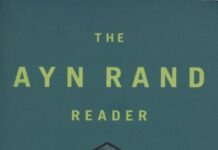
Ebook Info
- Published: 1986
- Number of pages: 420 pages
- Format: EPUB
- File Size: 0.38 MB
- Authors: Ayn Rand
Description
In this series of essays, Ayn Rand presents her stand on the persecution of big business, the causes of war, the default of conservatism, and the evils of altruism.The foundations of capitalism are being battered by a flood of altruism, which is the cause of the modern world’s collapse. This is the view of Ayn Rand, a view so radically opposed to prevailing attitudes that it constitutes a major philosophic revolution. Here is a challenging new look at modern society by one of the most provocative intellectuals on the American scene. This edition includes two articles by Ayn Rand that did not appear in the hardcover edition: “The Wreckage of the Consensus,” which presents the Objectivists’ views on Vietnam and the draft; and “Requiem for Man,” an answer to the Papal encyclical Progresso Populorum.
User’s Reviews
Reviews from Amazon users which were colected at the time this book was published on the website:
⭐I wanted to get a grasp of Ayn Rand‘s political ideals. She gives a morality to capitalism.
⭐After reading Ayn Rand’s presentation of capitalism, it makes the reader wonder sadly why America is so blasé about the fact that it is disappearing at such an alarming rate. America created it, but she is also destroying it. We are killing what made us so great!
⭐Justice demands that small businessmen be reduced to corporate employeesAccording to Ayn Rand: “Every ugly, brutal aspect of injustice toward racial or religious minorities is being practiced toward businessmen” (41). Even if there is some validity in the claim that big business is sometimes treated unfairly, this is childish hyperbole. America has not yet had a policy of genocide against big business so Christians can steal their property. The government has not yet issued a decree that all businessmen must vacate their homes and move away to reservations in the desert. They are not lynched, nor beaten, their children are not sold away from them, and their daughters are not required to submit to their owners’ lechery. They are never shot nor arrested for striking for decent wages and working conditions. All that is required of them is that they pay income tax on their wildly excessive wealth that they do not need, and can only with the wildest and most narcissistic stretch of the imagination be said to have earned or to deserve. This is not remotely like slavery.On the other hand, Rand and Alan Greenspan describe the anti-trust system in which the laws are confusing, in which merely by defending themselves successful businessmen put themselves in even greater danger, and in which companies are “being condemned for being too successful, too efficient, and too good at competition” (Greenspan, p.72). I know too little about the anti-trust laws, or the specific cases Rand and Greenspan describe, to know the other side of the story, but it sounds like a legitimate complaint. On the other other hand, in ATLAS SHRUGGED, the companies driven out of business by more successful companies are always caricatures of incompetence. In the real world, many competent businesses are driven out of business by underhanded practices, and this was part of the motivation for developing anti-trust laws. Admittedly, in the real world (as opposed to Rand‘s disingenuous fantasy world) larger companies will always be able to produce and sell commodities less expensively than smaller companies, however competent the smaller company may be, and drive them out of business by legal — though hardly moral — means. Maybe the big companies became big by virtue of greater efficiency and a better product, or just as likely, maybe an already gigantic company pumped a lot of money into a new enterprise. As Nathaniel Branden says, “a chain store could give [the neighborhood] better service at lower prices and thereby let them save money . . . no one has a vested right to a position if others can do the job better than he can” (P. 78). So small neighborhood stores, restaurants, and farms must sell out to corporations. These small businessmen whine about unfairness, but that’s what capitalism is all about. It makes no sense to be in favor of laisser-faire capitalism, yet opposed to successful corporations. “When people denounce the free market as ‘cruel,’ the fact that they are decrying is that the market is ruled by a single moral principle: justice” (p.78). These small businessmen and farmers can now get jobs with the corporations, at the lowest wages the corporation can get away with paying (as determined by the ‘free’ market); and more and more of the nation’s wealth will be concentrated into the hands of fewer and fewer people. However, it is not the nation‘s wealth; it is their wealth.Laisser-faire capitalism leads inevitably to industrial feudalismRand and her cronies are typically disingenuousness on this topic. If we are to believe them, there are two sets of capitalists: those who operate under laisser-faire rules, and those who use their pull to get handouts from the government — “wealthfare,” as we call it. Rand complains: “A system of pure, unregulated laissez-faire capitalism has never yet existed anywhere” (p. 45). Marxists, Christians, and Moslems can and do make the same complaint, with equal truth and justification. This is because people cannot be depended upon to behave according to whatever your favorite ideology happens to be. Wealthy people are always going to have pull with the government, and can be counted upon to use it, unfairly, and against whatever the “rules” are supposed to be. Unregulated capitalism is always going to be corrupt. That is simply self-evident. Alan Greenspan finally acknowledged that which those of us who know very little about economics had always known. Rand asks, and answers herself: “What is economic power? It is the power to produce and to trade what one has produced” (p. 44). As if that was all that there was to it. But economic power is also, obviously, the power to buy and control and essentially be the government. The one thing that all societies have had in common, throughout the entirety of mankind’s history, is that they have been governed by the wealthy. This was even — one might even say especially — true of the so-called “socialist” governments of China and the Soviet Union. America’s Founding Fathers, or at least some of them, wrote the Constitution establishing democracy in an attempt to prevent one segment of society from having undue power. It has never worked perfectly, and in the past thirty years or so, accelerated by Reaganomics, it has all but collapsed. “The businessman’s tool is values; the bureaucrat’s tool is fear” (p. 45). But the businessmen either are the bureaucrats, or they have bought them. The justice of unregulated capitalism leads to giant corporations, leads to greater and greater stratification of society, which leads to a system of industrial feudalism. Presumably, all Americans are acquainted with President Eisenhower’s warning of the coming — now already well-enthroned — power of the military-industrial complex. Jack London, in THE IRON HEEL, quotes Abraham Lincoln regarding oligarchic power: “I see in the near future a crisis approaching that unnerves me and causes me to tremble for the safety of my country. . . . corporations have been enthroned and an era of corruption in high places will follow, and the money power of the country will endeavor to prolong its reign by working upon the prejudices of the people until all wealth is aggregated in a few hands and the Republic is destroyed.” —U.S. President Abraham Lincoln, Nov. 21, 1864 (letter to Col. William F. Elkins) (Ref: The Lincoln Encyclopedia: The Spoken and Written Words of A. Lincoln). So far, in nothing that I have read by Ayn Rand, does she ever use the word democracy. The “freedom” Ayn Rand favors is that which permit’s frees the super rich to form giant corporations so that America will have government by oligarchy.Since, as Rand acknowledges, laisser-faire capitalism has never yet existed, it is impossible to know whether it would actually work as conjectured. Expecting the ‘invisible’ hand of the market to make everything work out right, if employers, employees, and customers behave according to their own selfish interests, is not intrinsically convincing. This is analogous to expecting justice to prevail in a trial in which prosecutors and defense attorneys present all of the skewed “facts” favorable to win their case, completely irrespective of the truth of guilt or innocence, and even though both sides know but ignore this truth in the interest of winning their case. Justice is likely to be determined by whoever can buy the better lawyer. As Supreme Court Justice Antonia Scalia (in the video Truth on Trial, from Ethics in America) exclaims: “If you don’t hire a good lawyer, it’s your fault.” The most successful lawyers are not successful because they are always on the side of justice, but because they are skillful in manipulating juries to get verdicts favorable to those clients wealthy enough to buy justice. In the real world, it is not clear that the best products always win — the corporation able to pay for expensive advertising, or sell relatively inexpensive but shoddy products to people who do not earn enough to pay for better — will be the winner; nor do employees work voluntarily — seriously, what choice do they have? Nor — especially not — is it true that having the vast bulk of the nation’s wealth controlled by a small percentage of the society is synonymous with a non-statist society. Democracy is the hallmark of a non-statist society — not laisser-faire capitalism. Democracy and the extreme economic stratification to which unregulated capitalism inevitably leads cannot coexist.
⭐Reagan was so close, Trump was approaching it, DeSantis may be a hope. Rand at her clearest best with a Great history of the approaching Socialism of the 1960’s.Please wake up, USA or we’ll end up like Germany and England!!!!!
⭐A few years ago, after living through the worst presidency I’ve witnessed, that of Bush 43, I began to pay more attention to econo-political ideas. I was a moderate leftist, believing that conservatives and their Wall St partners had bankrupted the world economy. I was very receptive to liberal criticisms of so-called capitalism and the profit motive as the conduit for the greed that led to the aforesaid bankruptcy. It really seemed to me that the only solution was a more stringent regulatory environment. Looking back on it, I can still understand why I believed as I did.Somewhere along the line, I began to start questioning my beliefs. I went back to school to earn an MBA and learned more about finance and economics. I hypothesized my own views about all this as though I were a business owner or CEO, facing turbulent market conditions. Then I noticed something. No business owed me a job, no gov’t agency owed me survival, no one else owed me anything. In simple terms, my needs place no justifiable moral obligation on anyone else.Although I was familiar with this book, I felt for a long time that I wasn’t ready for it. Should all those liberal beliefs I’d adopted turn out to be wrong? In some ways, no. I was still sure that bigotry and nationalism weren’t defensible. In basically every other way, yes. Liberal economic ideas are, once you’re honest about policy ideas, fully indefensible.Conservative or liberal leaning, I definitely recommend one take the ideas advanced in this book seriously. Consider them and be honest with yourself. The most extraordinary idea for me is that the cause of most of the problems of which we lament is the same regulatory power we hope will fix them. After this I’ll be studying economic history of this regulatory environment to determine if/how it led to market imbalances and distorted incentives. So long as gov’t has legal power over commerce, crony capitalism (NOT REAL CAPITALISM) will never end. Yet I’m curious to see how the regulatory machinery may create more problems than it solves. For now, I’d consider myself tentatively in favor of laissez faire capitalism.I can also fully recommend the blog talk radio podcast of Dr Yaron Brook. It’s a very thought provoking show for those tired of being locked into the outdated liberal-conservative buckets.
⭐This is undoubtedly one of my favourite books. It is full of essays, with clear and concise defence of Capitalism. It’s a brilliant book for picking up when you have 5 minutes and time to read a quick essay.I found myself enjoying Alan Greenspan’s essays more than I thought. He really could be Dr Stadler. How can a proponent of a Gold Standard then become the head of the immoral, Federal Reserve and then inadvertently help cause the 2008 crises, with the help of Bill Clinton. It truly is Atlas Shrugged coming to life. (Check out John Allison lectures on the financial crises on YouTube. His explanation is truly remarkable and brilliantly explained).Capitalism is truly the only moral political and economic system. I honestly think, if this book was more widely read, it would change the world.
⭐The book is a good collection of essays on various points which relate to the main theme of Capitalism. Rand offers a defense of Capitalism and why it is the only system that we know of that yields a great amount of material and civil development whilst retaining and promoting the liberty of the individual. The defense is however offered in the context of her own philosophy and her argument therefore relies upon the premises of her system of morality and rationality. Throughout the work she introduced the concepts of moral ‘principle’ and ‘ideology’ and builds a case for why these are important by making examples of various events, citing article extracts and so on in order to analyze and produce her evidence.The promotion of Capitalism on moral ideals and practical examples are often contrasted against the purported effects of altruistic/Socialist consequences and actions of a controlling government. Rand introduced the term ‘Statist’ to describe systems and those who ascribe control and planning as means to achieve their goals, in this context the control is mainly economic. I believe Rand and her associates offer a compelling case against political control of the market by examining the direct and indirect negative effects whilst offering in turn the benefits of a free market. In the true Libertarian inspired tradition of concern for the rights of the individual, the ultimate effects of Statist control are portrayed as devastating to the rights and freedom of the individual.A number of essays included are by Nathaniel Branden and Alan Greenspan. Greenspan provides the backbone of the book through his analysis of the technicalities of a free market system and how it is superior to those who receive government aid, he also provides a potent portrayal of how a mixed economy can be abused through government bureaucratic controls, e.g lobbyists by those who under a free system would be unable to exploit such structures that government interference creates.Branden himself covers the practical effects on institutions such as education, however I feel that in his arguments he is a little vague as to the ultimate effect that such measures of reform would have. He also covers the topic of ‘Alienation’ rebutting the Hegelian/Marxist mystic concept of the term and proposing in favour a case for people as being alienated through the lack of self-esteem and happiness due to lack of rational decision and personal freedom. However I feel this is a point so abstract as to perhaps question the concept of ‘Alienation’ itself.The whole book therefore rests on the premise that historically Capitalism in it’s semi-enabled forms during the 19th century and early twentieth were not exploitative systems of class struggle or disproportionate wealth but rather a revolutionary system of development for all through the ability of rational individuals.The only weak points that I feel this book has, at least from the view of an acceptance of a majority of Objectivist premises or arguments is that Rand herself begins to repeat the same points frequently in the later chapters, perhaps however it is a means to show the depth of the issues, however I felt that it did impact negatively on the fluidity of the read itself. And also Branden’s vagueness as I already mentioned, I feel let the book down, had he been more concise with his conclusions, I could well have rated this book with five stars.Overall a good book for someone seeking a defense of Capitalism on practical and philosophical grounds.
⭐I found Rand’s explanation for the capitalism system very well build and tied up with philosophical principals. I thoroughly recommend it to anyone who’d like to go deeper in the basis for the capitalist system.
⭐This is a fascinating book. Although you might not agree entirely with Ayn Rands views it brings home how governments and organisations manipulate and distort.
⭐This is definitly a brush up on your old multi syllabal vocabulary. But even though the articles stem from the sixties, they are just as valid today.Recommend especially “Root of war”
Keywords
Free Download Capitalism: The Unknown Ideal in EPUB format
Capitalism: The Unknown Ideal EPUB Free Download
Download Capitalism: The Unknown Ideal 1986 EPUB Free
Capitalism: The Unknown Ideal 1986 EPUB Free Download
Download Capitalism: The Unknown Ideal EPUB
Free Download Ebook Capitalism: The Unknown Ideal



